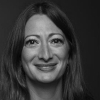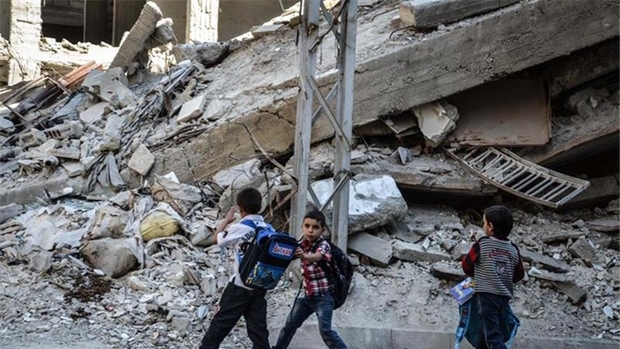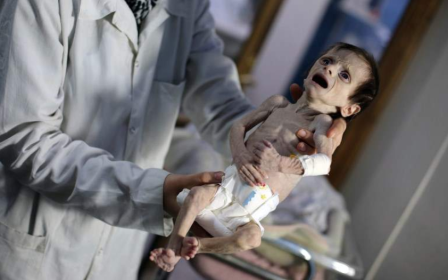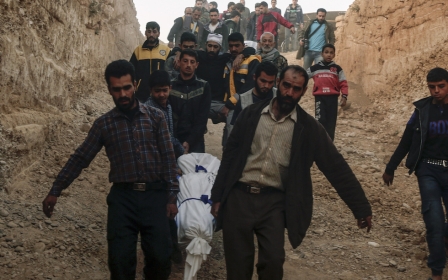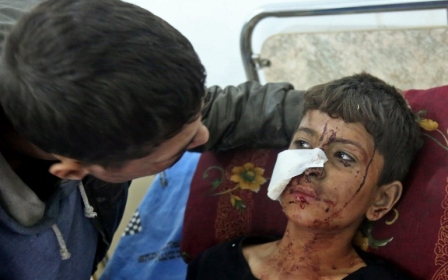Tales of hope from Syria's Eastern Ghouta
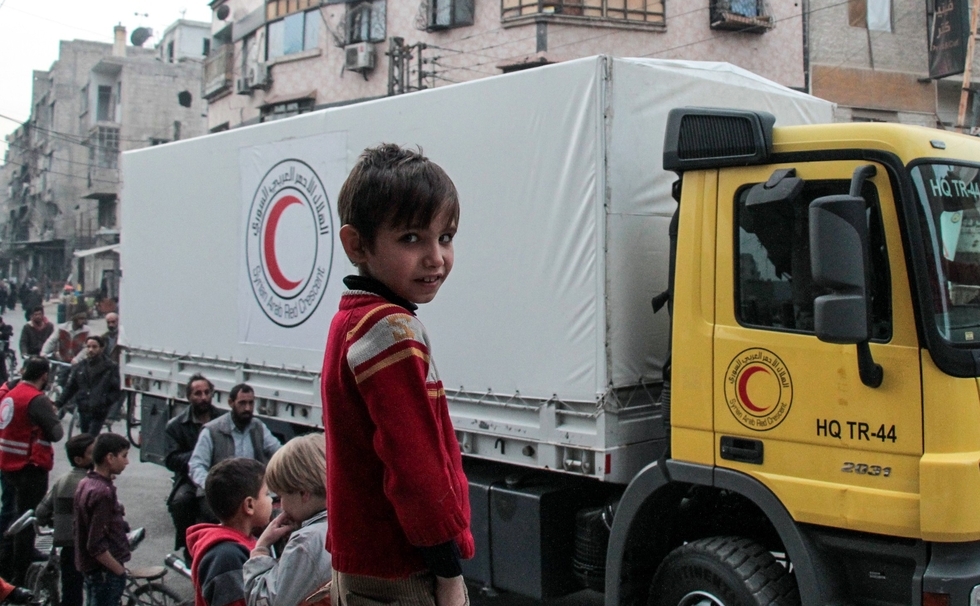
Exactly a year ago, Aleppo's residents in rebel-held areas were beset by a months-long siege and heavy bombardment by the Russian-backed Syrian government forces. The bombing and destruction of the children's hospital, the Independent Doctors' Association's (IDA), was one of the many war crimes committed at the time.
In a bid to transform anger into a positive action back in the UK, we, doctors and humanitarians and activists from Syria and elsewhere, launched The People's Convoy, a crowdfunding campaign in order to rebuild IDA's children's hospital for the seventh time.
After two weeks, with 38 organisations and nearly 5,000 people from around the world, almost £250,000 was raised, enough to rebuild the hospital.
The local medics and aid workers in Eastern Ghouta, some of the people in crisis, are there daring to do what others can't or won't
On 17 December 2016, the hospital equipment was transported in a convoy from London to the Syrian-Turkish border along with hundreds of messages of solidarity and delivered to our partner, IDA.
A mere three months later, in the countryside outside Aleppo, Hope Hospital opened its doors and has since treated 18,144 children. "How tragic that what happened to the people of Aleppo is still happening to people in [Eastern] Ghouta right now," said Dr Hatem (who goes by his first name only), director of the IDA in Aleppo.
No more bang bang stories
Exactly a year on in Ghouta, 15km east of Damascus, 400,000 people are meeting a similar, shocking fate to those in Aleppo.
The area has been besieged since 2013 and humanitarian conditions there have deteriorated sharply amid the violence that intensified in mid-November. In that time Ghouta has been pummelled by more than 200 air strikes.
The healthcare system has largely collapsed, with medical workers describing it as one of the worst health and nutrition situations since the conflict began.
The latest UN reports state that 500 people need to be evacuated for urgent medical care. Unlike Aleppo, however, the global media is almost silent and much less action than ever is being taken by the international community.
Apparently we, in the West, don’t want to hear about it, we are tired and have compassion fatigue
When I ask my journalist friends about it, they are quick to blame the people in the West. Apparently we, in the West, don’t want to hear about it, we are tired and have compassion fatigue.
I disagree. People are fed up with bang-bang stories and images of explosions and destruction that are devoid of humanity, yet there are countless tales of hope, love and sacrifice that live amid the rubble.
This year, we have worked with three small but mightily effective Syrian NGOs who successfully fundraised for essential healthcare projects on our crowdfunding platform, funded by engaged citizens of the world.
Thanks to these citizens, the NGO Insan, for example, is able to provide psychosocial support for those exposed to shelling, starvation and limited healthcare.
Ghiras al-Nahda is training a community to grow mushrooms as a fresh food source where no others are available; and Hurras is creating an educational magazine to help Syrian children develop their emotional resilience while teaching the values of tolerance and solidarity.
Taking action
These are vital campaigns that are changing lives – and they are needed now more than ever. As the situation in Ghouta continues to deteriorate, we are supporting our partner Insan to run an emergency campaign.
Insan is seeking urgent funding to provide intensive psychosocial care to their psych field team of 14 women via WhatsApp. They are in almost constant contact, listening and reinforcing their recent training.
The psychologists are also providing advice and guidance to the women to support their personal networks, friends and family who have taken shelter with them during times of shelling.
Due to the increasingly dangerous conditions and limited connectivity, the team is also developing a prototype self-help mobile app which will provide the basic techniques and steps of psychosocial support and reach more women in need of emotional and psychological support.
As Ghouta is besieged and we can't get aid in, we want to take action.
Break the silence
We want to break the silence and break the siege. We have an unshakable belief in the innate goodness of humankind. Our lives are woven together in so many different ways and on so many levels.
We can live our lives being self-centred, caring only about the few within our close sphere of contact, or we can choose to expand that circle to include as many other beings as possible. I personally love the Tibetan philosophy of dedicating our lives for the benefit of all beings. This approach is not about ignoring our own personal lives and happiness, quite the opposite.
It is about the fundamental realisation that our happiness is linked to those around us in our family, friends, community, work and around the world. The best way to attain well-being and happiness is by dedicating our personal growth and actions so that it may benefit as many people as possible, i.e. a non self-centred approach as a central motivation.
We may not be able to calm the multiple storms that hit our world and fellow human beings but we absolutely can stand together with those in the eye of the storm. The local medics and aid workers in Eastern Ghouta, some of the people in crisis, are there daring to do what others can't or won't.
Their tales of resilience, courage and determination to save lives at risk to their own, as briefly demonstrated in this article, helps me to keep this unshakable faith in humanity. More to the point, it demonstrates it is not all futile, insurmountable and hopeless.
There is hope, opportunity and possibility even in the eye of the storm. I hope we can prove the media wrong. Not only do people care, but we will channel that care to make a positive difference to as many people as we can.
- Rola Hallam is a consultant anaesthetist. As medical director of Hand-in-Hand-for-Syria, she played an integral part in building hospitals and health centres across Syria. She lectures at the London School of Economics and King’s College London. Her ongoing quest to provide access to healthcare for all has led her to launch CanDo, a not-for-profit social enterprise enabling local humanitarians to provide healthcare to their war-devastated communities.
The views expressed in this article belong to the author and do not necessarily reflect the editorial policy of Middle East Eye.
Photo: A Syrian boy watches as packages humanitarian relief, provided by the International Committee of the Red Cross (ICRC) in a joint operation with the UN, are unloaded in the town of Douma in the rebel-held Eastern Ghouta region, east of the capital Damascus on 12 November 2017 (AFP)
This article is available in French on Middle East Eye French edition.
New MEE newsletter: Jerusalem Dispatch
Sign up to get the latest insights and analysis on Israel-Palestine, alongside Turkey Unpacked and other MEE newsletters
Middle East Eye delivers independent and unrivalled coverage and analysis of the Middle East, North Africa and beyond. To learn more about republishing this content and the associated fees, please fill out this form. More about MEE can be found here.


